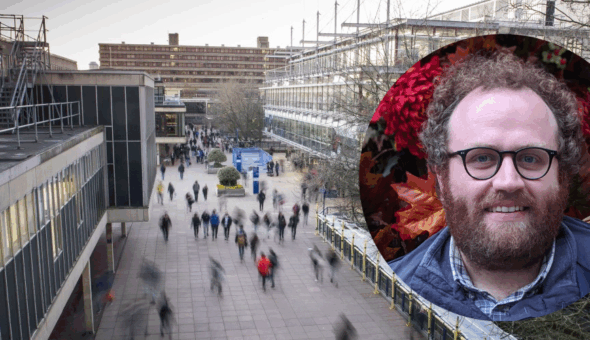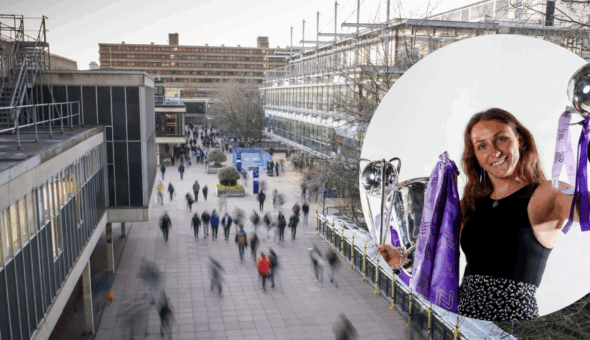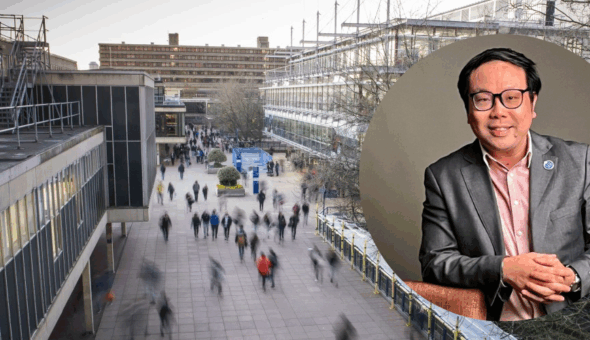Despite being made to run the Bath canal path in the frozen dead of winter, modern pentathlon athlete and sports performance graduate Sarah Collin can't get enough of Bath. Having studied for her degree at the University, Sarah returned to complete a master's in health, before graduating and becoming the University's Performance Sport Officer. We caught up with her to find out why she's kept coming back.
 Why did you choose to study at Bath?
Why did you choose to study at Bath?
As Bath is the National Training Centre for Modern Pentathlon it was a no brainer – my development as an athlete depended on me coming to train with some of the best athletes and performance support in the country.
I had always wanted to study a sports degree – sport was a fundamental part of my identity growing up, and still is now. There are very few institutions that offer as much choice and flexibility when it comes to sports degrees and holistic support for student-athletes.
For me, Bath was the best of them. I was blown away by the city when I visited for the open day, how green and beautiful the area was, so I knew overall it was the most natural fit for me.
Did you have a particular career in mind when you chose your course?
In all honestly, I prioritised my university choices by how likely it was that I could end up at the Olympics as an athlete, so Bath was the obvious choice for being the National Training Centre for Modern Pentathlon.
Ultimately, I didn’t quite achieve that goal as an athlete, but Bath has opened my eyes to all the different career pathways in sport that could still lead me to attending the Olympics one day.
Can you tell us about your experience of studying here? Any favourite memories, or places to go on campus and in the city?
My favourite part about studying at Bath was the people. There was such a high concentration of like-minded people in one place. At the school I went to before Bath, there were very few people there –friends and teachers alike – who believed sport was a priority. Obviously, Bath attracts a lot of sporty people, so I really felt I belonged.
I still have a lot of close friends from my time at university because you can make those close relationships very easily as you all navigate similar challenges that student-athletes face together. There was a real camaraderie among those doing sports degrees.
Two memories stand out for me. It was the 1st of December one year (I want to say 2016) and there was a very heavy frost — it was still about -3 degrees when we had a running session along the canal from Sydney Place to the Dundas Aqueduct. The canal had frozen over, and all the fields and gardens were covered in silver from the frost and ice. We ended up with ice on our eyelashes, hats and gloves from our sweat freezing over. But it was an absolutely breath-taking scene and felt very Christmassy. It put us in such a good mood. I regularly run along the canal even now and it’s still like I’m seeing it for the first time. The views are just something else.
When one of the major Modern Pentathlon Championships were hosted at the University, the infield of the athletics track was converted into a riding arena. There is no stranger feeling than being on a horse while you’re at university with a crowd of spectators cheering you on from the balcony of the STV.
Describe your career journey since graduating.
I graduated from my undergraduate degree in 2019 and was at a bit of a loss of what to do next. In the end, I got funded to complete a master's in health at the University, working with West Ham Football Club.
The foundation who funded me are called Switch the Play, the UK’s only charity dedicated to supporting all sportspeople to successfully transition into life outside of sport. I conducted research with their Academy players and coaches about the pressures and challenges they face with their mental health.
I then graduated in September 2020 during the pandemic so there weren’t too many opportunities in the sports industry at that time. From my experience as an athlete, working with Switch the Play, and with the support of my personal tutor and sport psychologist, I knew I wanted to be involved in supporting athletes and their ambitions, with a particular affinity towards promoting athlete welfare and duty of care. I spent a lot of time during the various lockdowns completing courses and qualifications, gaining valuable work experience and CPD opportunities. All of which were suited to my new role of Performance Sport Officer back here at the University of Bath.
What is a typical day like in your role?
The role can be quite varied; I manage the application and selection process of our dual career and scholarship athletes, as well as working with academic staff — particularly in the sports degrees — with their recruitment and development initiatives.
Day-to-day, the Head of Student Performance and I work to ensure individuals achieve both academic and athletic excellence. Currently, I am reviewing the Dual Career Programme to ensure we are providing a bespoke and holistic service to athletes who also study at Bath.
My favourite parts of the role are the workshops and 1-1 meetings I deliver as an Athlete Personal Development and Performance Practitioner. This is an individual coaching and mentoring service to TASS and Dual Career Athletes that supports athlete well-being, and encourages and facilitates personal and professional development alongside competitive sporting careers as they move on to, through and beyond the University of Bath.
How did your studies help you to develop?
I think sports performance is the perfect degree for high-performing Dual Career athletes, particularly for individual sports. It gave me so much insight into why I follow certain programmes and what best practice in elite sport should look like.
I particularly liked how the tutors ensured that we all understood how the theory could be applied to real-word settings. As my cohort were mostly all dual-career athletes, it resonated with our day-to-day training and long-term development. A lot of athletes think that the only pathway after competing is moving into coaching, but the variety of modules and disciplines that we had confirmed that wasn’t the case at all.
Personally, it opened my eyes to all the transferable skills I had from being a dual-career athlete that I could use to my advantage. I’m aiming for a career in sports governance, at performance director or policy advisor roles, so I can utilise my analytical skills from research projects, combined with my lived experiences as an athlete to ensure that we as an institution are providing the right solutions to the challenges that dual career and fulltime athletes face.
What advice would you give to prospective students thinking about studying your course at Bath?
Keep an open mind on where you think your journey is going to lead you. I was very certain I was going to make it to the Olympics in my first year, as did a lot of my friends at the time. Realistically this isn’t the case for a lot of athletes on a talent pathway. However, that’s not to say you won’t discover some other fascinating opportunities in sport at Bath either.
Use the support services you have at your disposal, particularly if you’re an athlete. They’re the experts and will provide some very thought-provoking and eye-opening advice where and when you least expect it.
When it comes to opportunities, say yes to everything. Volunteers needed for sports events? Yes. Team Managers and chaperones needed for talent pathways? Yes. Coaching opportunities? Yes. You’ll discover your passion and develop the skills needed to pursue it without even noticing.
Respond



